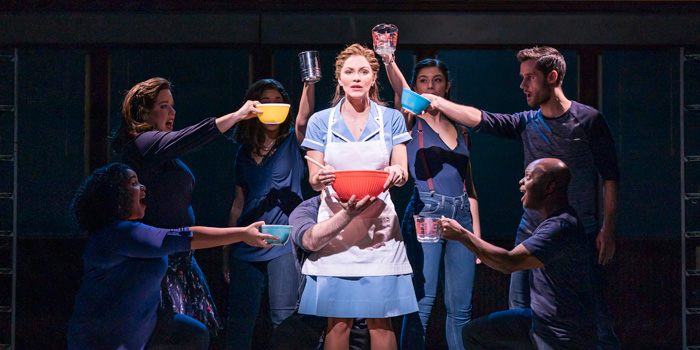An astonishing statistic about this Broadway transfer is that it’s the first Broadway show with an all-female lead creative team, and the same is true of the West End production. Writer, composer, director, choreographer, musical director, and the three lead cast: all women.
It’s also really wonderful, with the sweetness, crispness and comfort of the best homemade pie, and boasts one of the best scores to be written in recent years.
Based on the late Adrienne Shelly’s 2007 film, it’s your everyday pregnant-waitress-falls-in-love-with-her-dorky-gynaecologist story: Jenna works in a diner, finds out she has a bun in the oven, and finds escape from her abusive husband Earl in both piemaking and lovemaking.
Shelly’s film is quirky in many places. Jenna frequently gets absorbed in meditative fantasies where she creates new and wondrous pies based on what she’s feeling. And the characters around Jenna are real oddballs, like shy and squeaky Dawn, who is obsessed with Civil War re-enactment and has never been on a date. Laura Baldwin pulls off the role well, particularly the contrast between Dawn’s shyness when talking and her expansive voice when singing.
Marisha Wallace’s brassy Becky completes the waitress trio. She also finds a bit of fun behind her husband’s back with the diner’s chef. Dawn and Becky are caricaturish, and Dawn’s love interest Ogie is pure farce. In the middle of this larger-than-life world around her, this polished chrome and bright neon diner with a highway running past, Jenna is an anchor of normality.
So the show has to juggle an unwanted pregnancy, baking, family, affairs, an abusive husband and broad comedy all in one. Not that Jessie Nelson’s book and Diane Paulus’ direction struggle to achieve this. Everything about the show is polished, and the jumping between silly and serious never feels jarring.
On top of that is the music by the many-times Grammy nominated singer-songwriter Sara Bareilles: perfectly constructed pop songs with a conversational feel, full of piano-driven riffs and jam-packed with baking metaphors. Bareilles is the consummate queen of hooks. Every song is instantly singable, each with beautifully melodic tunes full of unexpected intervals.
Leading the cast, and reprising the role after playing it on Broadway, is Katharine McPhee, known to American audiences for her break on American Idol and subsequently successful singing career. McPhee has a rich voice with impressive articulation between each note, to the point that she almost sounds autotuned. But there’s a sense that, when she sings, all her energy is being diverted into concentrating on singing and so the acting suffers.
In fact there’s a very fine line between the moments when her performance conjures a Jenna whose life has pulled her inside of herself – a patient, forbearing, passive woman, full of restraint – and sliding into bits where she just comes across as blank and expressionless.
Paulus very skilfully directs the scenes with husband Earl (Peter Hannah). The threat of violence is always latent, but only barely displayed. We don’t need to see physical violence to recognise an abusive, coercive, incredibly toxic relationship.
At the other end of the spectrum are some wildly comic scenes which, again, Paulus handles expertly. Jack McBrayer – familiar from Tina Fey sitcom 30 Rock – gets the overtly comedic numbers such as Never Ever Getting Rid of Me, which involves him jumping on tables and causing slapstick chaos in the diner. It is massively over the top, but it works.
David Hunter, too, makes his scenes as Dr Pomatter endearingly dorky and very funny. In fact, these scenes seem to be funnier than they were in the Broadway production thanks to Hunter’s loveable awkwardness.
What makes the show so lovely is the community the three women have built for themselves in this diner when they’re all surrounded by pretty awful people. In rehearsals Paulus describes Jenna, Dawn and Becky not as friends (they don’t socialise outside work) but as family. That’s the vibe they give off.
And threaded through, gossamer-thin but just as strong, is this idea of motherhood and how that concept, for Jenna, is completely connected to food and memory. Baking brings Jenna’s mum back to life and it forces her to reckon with the idea of being a mother herself.
Lorin Latarro’s choreography really adds to that by turning a whisk stir or an egg crack into elegant movements, and making those tactile, physical actions some natural extension of Jenna, as if shaping and moulding a wodge of dough is as instinctive an action as smiling.
Between the songs, Nelson’s book gives the three waitresses time just to chat, or interact with customers. Those moments do wonders for character development, and they really help the show breathe, help it open up its world. And yet there’s no flab: no moments of wasted time, no loss of pace.
The ending is conveniently swift and certain, resolving many its problems with a dusting of sugar. But the show is never too sickly sweet not to have serious points to make, and to make them forcefully.
It’s like someone’s taken a tried-and-trusted Delia Smith recipe and created a gourmet version. Every ingredient is the best quality – the songs, the direction, the choreography and the characters – and each combined in a careful, complementary way. In the end, you’ve still got a pie. But what a pie.
Source: https://www.thestage.co.uk/reviews/2019/waitress-musical-london-katharine-mcphee-sara-bareilles/
